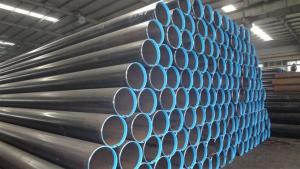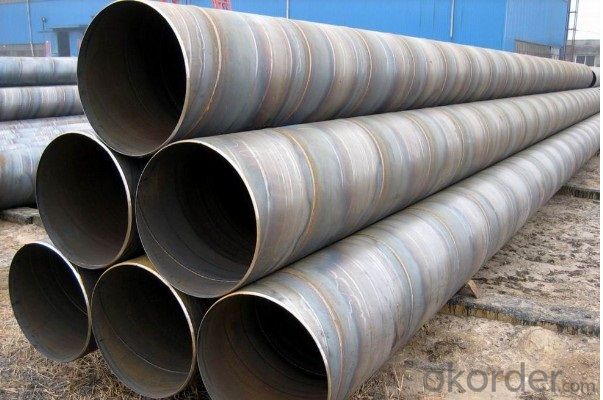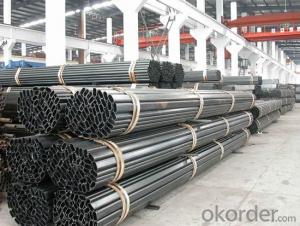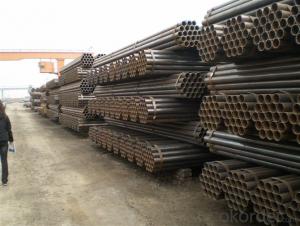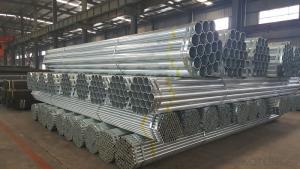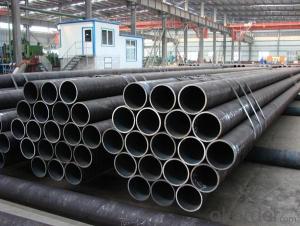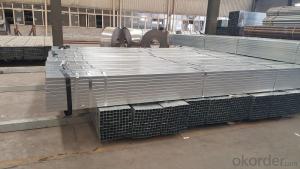Supplier--Welded steel pipe production serious
- Loading Port:
- Tianjin
- Payment Terms:
- TT OR LC
- Min Order Qty:
- 25 m.t.
- Supply Capability:
- 9000 m.t./month
OKorder Service Pledge
OKorder Financial Service
You Might Also Like
1、Structure of Seamless Pipe ASTM AL5:
Welded steel pipe is becoming more and more popular and it is formed by drawing a solid billet over a piercing rod to create the hollow shell. What we can provide you is different size and type of pipe and have high quality and satisfied price production.
2、Main Features of the Seamless Pipe AL5:
• High manufacturing accuracy
• High strength
• Small inertia resistance
• Have strong heat dissipation ability
• Have good visual effect
• Have more reasonable price
3、Seamless Pipe AL5 Specification:
Standard | GB, DIN, ASTM ASTM A106-2006, ASTM A53-2007 |
Grade | 10#-45#, 16Mn 10#, 20#, 45#, 16Mn |
Thickness | 8 - 33 mm |
Section Shape | Round |
Outer Diameter | 133 - 219 mm |
Place of Origin | Shandong, China (Mainland) |
Secondary Or Not | Non-secondary |
Application | Hydraulic Pipe |
Technique | Cold Drawn |
Certification | API |
Surface Treatment | factory state or painted black |
Special Pipe | API Pipe |
Alloy Or Not | Non-alloy |
Length | 5-12M |
Outer Diameter | 21.3-610mm |
Grade | 20#, 45#, Q345, API J55, API K55, API L80, API N80, API P110, A53B |
Standard | ASME, ASTM |
1) Material:20#(ASTM A 106/A53 GRB.API5LGRB,GB),45#,16Mn,10#.
2) Specification range:OD:21.3-610mm,WT:6-70mm,length:6-12m or according to the requirement of clients.
3) Excutive standards:GB,ASME API5L.ASTM A 106/A53,Despite of the above standards,we can also supply seamless steel pipe with standard of DIN,JIS,and so on,and also develop new products according to the requirements of our clients!
4) Surface:black lacquered,varnish coating or galvanized.
5) Ends:Beveled or square cut,plastic capped,painted.
6) Packing:bundles wrapped with strong steel strip,seaworthy packing.
4、Packaging & Delivery
Packaging Details: | seaworthy package,bundles wrapped with strong steel strip |
Delivery Detail: | 15-30days after received 30%TT |
5、FAQ of Seamless Pipe ASTM AL5:
①How is the quality of your products?
Our products are manufactured strictly according to national and internaional standard, and we take a test
on every pipe before delivered out. If you want see our quality certifications and all kinds of testing report, please just ask us for it.
Guaranteed: If products’ quality don’t accord to discription as we give or the promise before you place order, we promise 100% refund.
②How about price?
The first thing is we can sure the quality of production you need, and we are factory and be able to give you lowest price below market one, and we have a policy that “ for saving time and absolutely honest business attitude, we quote as lowest as possible for any customer, and discount can be given according to quantity”.
③Why should you chose us?
Chose happens because of quality, then price, We can give you both.Additionally, we can also offer professional products inquiry, products knowledge train(for agents), we can provide you professional service and we sure it will be a good choice to teamwork and business with us.
6、Seamless Pipe ASTM AL5 Images:
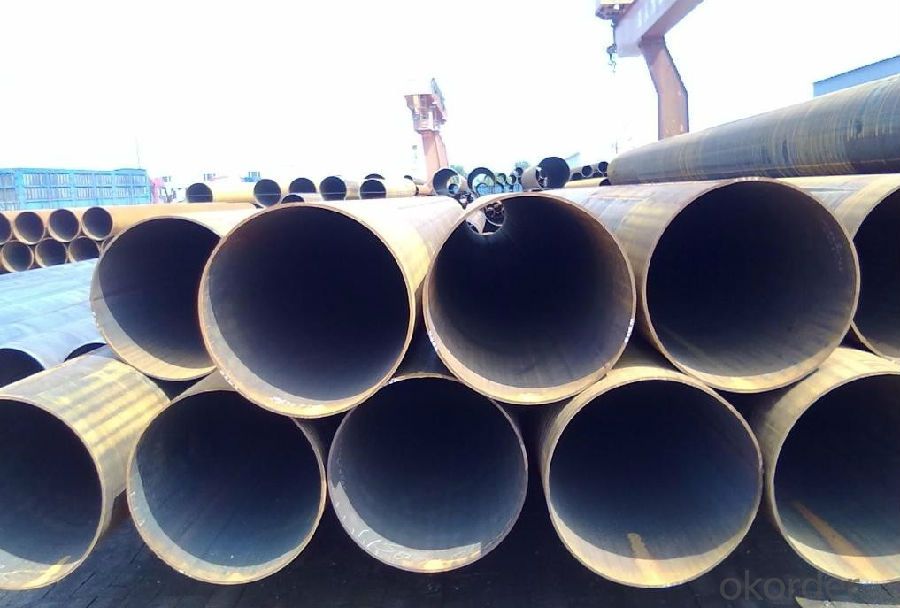
- Q: What does seamless steel tube mean? What are the main uses? What are the classifications?
- Seamless steel pipe having a hollow cross section, used as a conduit for conveying fluids, such as pipelines for transporting petroleum, natural gas, gas, water, and certain solid materials. Compared withsteel and roundsteelinsolid, flexural torsional strength in the same time, the weight is light, is a kind of economic section steel, widely used in the manufacture of structural parts and mechanical parts, such as the oil pipe, automobile transmission shaft, the bicycle frame and steel construction with scaffold with steel pipe manufacturing ring parts can be improved the utilization rate of materials, simplify the manufacturing process, material saving and working hours, has been widely used to manufacture steel tube.
- Q: How to descaling galvanized steel pipe?
- Is red rust or white rust, red rust is the base material rust, white rust is Zinc Coating Rust
- Q: How are steel pipes used in the manufacturing of sewage treatment plants?
- Steel pipes are commonly used in the manufacturing of sewage treatment plants primarily for their durability, strength, and resistance to corrosion. These pipes are utilized for various purposes within the treatment process, including transporting sewage and wastewater between different treatment units, carrying chemicals for disinfection or neutralization, and providing structural support for the plant's infrastructure.
- Q: What are the different types of steel pipe reducers?
- There are several different types of steel pipe reducers that are commonly used in various industrial applications. These reducers are designed to connect pipes of different sizes, allowing for a smooth transition in the flow of fluids or gases. Here are some of the most common types: 1. Concentric Reducers: These reducers have a symmetrical design with a centerline that aligns with the centerline of both the larger and smaller pipes. They provide a gradual reduction in pipe size, ensuring a smooth flow of material. 2. Eccentric Reducers: Unlike concentric reducers, eccentric reducers have an offset centerline. This design is useful when there is a need to prevent the accumulation of air or gases in the piping system. The eccentric reducer helps to direct any gas or air towards a vent or drain point. 3. Welded Reducers: These reducers are made by welding two pipes of different sizes together. They are commonly used in situations where a permanent connection is required. 4. Seamless Reducers: Seamless reducers are manufactured without any welded joints. They are made from a single piece of steel, which enhances their strength and durability. Seamless reducers are often preferred in applications where leak-proof connections are critical, such as in high-pressure or high-temperature environments. 5. Threaded Reducers: These reducers have male and female threads on either end, allowing for easy installation and removal. They are commonly used in low-pressure applications and are an economical choice for systems that require frequent disassembly. 6. Flanged Reducers: Flanged reducers have flanges on both ends, which are bolted together to create a tight seal. They are often used in piping systems that require easy access for maintenance or inspection. Each type of steel pipe reducer has its own advantages and is selected based on the specific requirements of the application. It is important to consider factors such as the type of fluid or gas being transported, pressure and temperature conditions, and the need for easy installation or maintenance when choosing the appropriate reducer for a particular system.
- Q: Can steel pipes be used for sewage and wastewater systems?
- Yes, steel pipes can be used for sewage and wastewater systems. Steel pipes are highly durable, resistant to corrosion, and can withstand high pressure and temperature conditions, making them suitable for transporting sewage and wastewater efficiently and securely. Additionally, steel pipes have a long lifespan and can handle the abrasive nature of sewage and wastewater, making them a reliable choice for such systems.
- Q: Are steel pipes suitable for offshore drilling platforms?
- Steel pipes have been widely used in offshore drilling platforms because of their strength, durability, and resistance to corrosion. These platforms operate in harsh marine environments, where they are exposed to saltwater, extreme pressure, and temperature changes. Steel pipes are capable of enduring these conditions and serving as a reliable and long-lasting solution for transporting fluids, such as oil and gas, from the seabed to the surface. Moreover, the ability to weld steel pipes together facilitates their easy installation and maintenance on offshore drilling platforms. In conclusion, steel pipes have proven to be an appropriate choice for offshore drilling platforms due to their robustness and ability to withstand the challenging conditions of the marine environment.
- Q: What are the limitations of using steel pipes?
- Some limitations of using steel pipes include their susceptibility to corrosion and rust, which can affect their durability and lifespan. Steel pipes are also relatively heavy and can be challenging to transport and install compared to lighter materials. Additionally, steel pipes may require more extensive maintenance and repairs due to their vulnerability to cracks and leaks.
- Q: How are steel pipes used in the water treatment industry?
- Steel pipes are commonly used in the water treatment industry for various purposes such as transporting water from one location to another, distributing treated water to consumers, and carrying wastewater to treatment facilities. Their durability, strength, and resistance to corrosion make them suitable for withstanding the harsh conditions often encountered in water treatment processes. Additionally, steel pipes can be easily welded and connected, providing a reliable and efficient solution for water transportation within the industry.
- Q: What quota is reserved for buried DN20 steel pipe?
- It is an embedded sleeve control sub item, if the reserved hole, then there is no need to cover, special subject structure adjustment factor of the cost of the water supply and drainage engineering, water supply and drainage engineering he is buried under the charge.
- Q: What are the different types of supports used for steel pipes?
- The different types of supports used for steel pipes include pipe clamps, pipe hangers, pipe saddles, and pipe rollers. These supports are designed to securely hold and suspend the steel pipes in place, ensuring proper alignment and preventing sagging or movement.
Send your message to us
Supplier--Welded steel pipe production serious
- Loading Port:
- Tianjin
- Payment Terms:
- TT OR LC
- Min Order Qty:
- 25 m.t.
- Supply Capability:
- 9000 m.t./month
OKorder Service Pledge
OKorder Financial Service
Similar products
Hot products
Hot Searches
Related keywords
